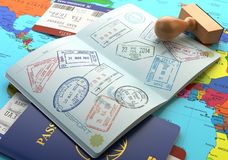The new visa waiver program for Europe’s Schengen Area will be arriving later than expected. The latest announcement from the European Union (EU) has stated that the ETIAS system will now be launched in 2025 instead of 2024. The European Travel Information and Authorisation System (ETIAS) has been in the works for several years. It
Visa Policy for Slovakia
Slovakia’s visa policy is comprised of the regulations and requirements established for foreign citizens who want to visit the country.
This policy will depend on whether the citizen is a national of a member country of the Schengen Area, a passport holder exempt from a visa but from outside of the Schengen zone, or a citizen of a country which is visa-required.
As Slovakia has signed the Schengen Agreement for passport-free travel, it shares the same visa policy as all Schengen countries.
Therefore, citizens of all Schengen countries do not need a visa to travel to Slovakia, regardless of the purpose of the visit. These citizens are simply required to show a valid ID Card at Slovakian border control.
Visa-exempt citizens who do not belong to the Schengen Area must travel to Slovakia with a passport valid for at least 3 months upon arrival, to be granted a visa-free stay not exceeding 90 days.
However, to travel to Slovakia for the same period from 2025, it will become mandatory for these same citizens to pre-register for an electronic travel authorization, ETIAS, once this upcoming online system is implemented.
This multiple-entry online visa waiver is being implemented to improve the security of Slovakia and all of the Schengen zone countries and will be available through an easy electronic form.
An approved ETIAS for Slovakia is electronically linked to the visitor’s passport and allows multiple stays in the Schengen Area for tourist reasons, business, transit, or medical treatment.
Since Slovakia does not currently offer the option of obtaining an online visa or visa on arrival, all foreign citizens who require a Slovak visa must apply in person at their Slovakian nearest government diplomatic office.
A Slovakian embassy travel document may be issued as a tourist visa, business visa, student visa, transit visa , or work visa, among other types of visas.
Below you will find a complete list of visa regulations to travel to Slovakia from your country of residence.



